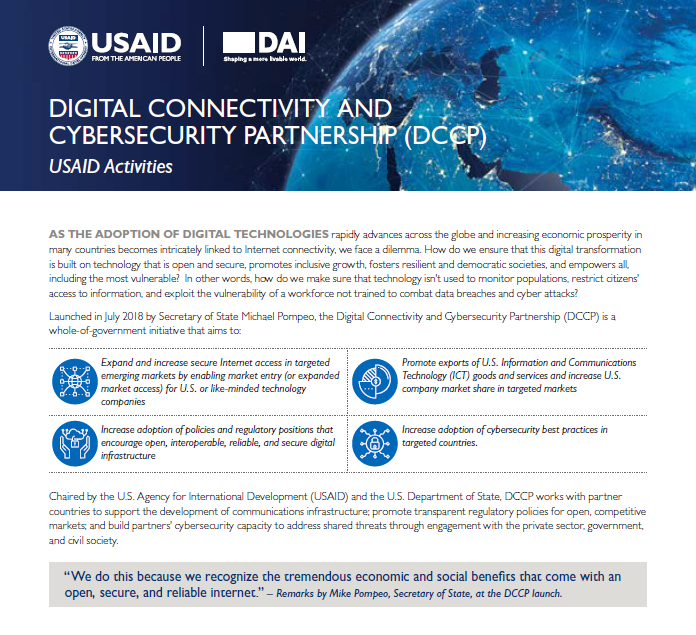- What We Do
- Agriculture and Food Security
- Democracy, Human Rights and Governance
- Economic Growth and Trade
- Education
- Environment and Global Climate Change
- Gender Equality and Women's Empowerment
- Global Health
- Humanitarian Assistance
- Transformation at USAID
- Water and Sanitation
- Working in Crises and Conflict
- U.S. Global Development Lab
Digital Development Content Top
Speeches Shim
As the adoption of digital technologies rapidly advances across the globe and increasing economic prosperity in many countries becomes intricately linked to Internet connectivity, we face a dilemma. How do we ensure that this digital transformation is built on technology that is open and secure, promotes inclusive growth, fosters resilient and democratic societies, and empowers all, including the most vulnerable? How do we make sure that technology isn’t used to monitor populations, restrict citizens’ access to information, and exploit the vulnerability of a workforce not trained to combat data breaches and cyber attacks?
Launched in July 2018 by Secretary of State Michael Pompeo, the Digital Connectivity and Cybersecurity Partnership (DCCP) is a whole-of-government initiative that aims to:
- Expand and increase secure Internet access in targeted emerging markets by enabling market entry (or expanded market access) for U.S. or like-minded technology companies;
- Increase adoption of policies and regulatory positions that encourage open, interoperable, reliable, and secure digital infrastructure;
- Promote exports of U.S. Information and Communications Technology (ICT) goods and services and increase U.S. company market share in targeted markets; and
- Increase adoption of cybersecurity best practices in targeted countries.
Chaired by the U.S. Agency for International Development (USAID) and the U.S. Department of State, DCCP works with partner countries to support the development of communications infrastructure; promote transparent regulatory policies for open, competitive markets; and build partners’ cybersecurity capacity to address shared threats through engagement with the private sector, government, and civil society.
Resources for Connectivity and Cybersecurity
Promoting American Approaches to ICT Policy and Regulation (ProICT) Factsheet: ProICT, an activity under the Digital Connectivity and Cybersecurity Partnership, provides technical assistance and capacity-building to help developing country governments establish ICT policy and regulatory frameworks that will enable an inclusive digital economy.
Digital Asia Accelerator (DAA) Factsheet: DAA, an activity under the Digital Connectivity and Cybersecurity Partnership, aims to advance economic development by increasing business’ and citizens’ capacities to use digital technology safely and effectively across Southeast Asia.
Digital Asia Accelerator Video Series: This video series is a 10-part Facebook-based campaign called “Online Safety” to raise awareness about good digital security practices among Cambodian users, particularly Cambodian small and medium-sized enterprises (SME) owners and staff. The campaign addresses common problems and security-related challenges that Cambodian users face online and gives them “tips and tricks” to protect themselves, their data, and their businesses online.
Advancing Timor-Leste’s Autonomous Telecommunications Landscape (ATLATL) Factsheet: ATLATL, an activity under the Digital Connectivity and Cybersecurity Partnership, is working to promote business-friendly policy and investment in the ICT sector in Timor-Leste.
South Asia Regional Digital Initiative (SARDI) Factsheet: SARDI, an activity under the Digital Connectivity and Cybersecurity Partnership, is working to improve digital connectivity in the South Asia region, strengthen the private sector and civil society’s digital capacity, and improve their ability to engage on ICT policy issues.


Comment
Make a general inquiry or suggest an improvement.